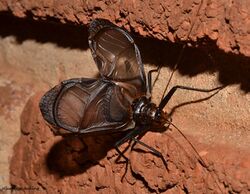Biology:Homoeogryllus orientalis
| South African bell cricket | |
|---|---|

| |
| Scientific classification | |
| Domain: | Eukaryota |
| Kingdom: | Animalia |
| Phylum: | Arthropoda |
| Class: | Insecta |
| Order: | Orthoptera |
| Suborder: | Ensifera |
| Family: | Phalangopsidae |
| Subfamily: | Cachoplistinae |
| Tribe: | Homoeogryllini |
| Genus: | Homoeogryllus |
| Species: | H. orientalis
|
| Binomial name | |
| Homoeogryllus orientalis (Desutter-Grandcolas, 1985)
| |
Homoeogryllus orientalis (Desutter-Grandcolas, 1985), the South African bell cricket, is a species in the tribe Homoeogryllini of the subfamily Cachoplistinae.[1] The species is reported from southern tropical Africa including parts of Mozambique and South Africa.[2] Within South Africa it has been reported south of the tropics in the Bushveld and in the Free State.[3]
Song
Recordings show that the male song of Homoeogryllus orientalis is almost identical to that of the related species Homoeogryllus reticulatus from the coast of tropical West Africa.[1] Recordings of presumed orientalis in the wild in South Africa also are consistent.[4] There is however no question of the two populations being of the same species, because there are marked differences between their genitalia.[1]
References
- ↑ 1.0 1.1 1.2 DESUTTER, L. 1985. Étude préliminaire des espèces africaines du genre Homoeogryllus Guérin-Méneville (Grylloidea, Phalangopsidae). Annales de la Société Entomologique de France. Nouvelle série 21(2): 189–206
- ↑ Orthoptera species file
- ↑ Ispot cricket identification
- ↑ [1] Field recording of wild male call
Wikidata ☰ Q10525737 entry
 |


